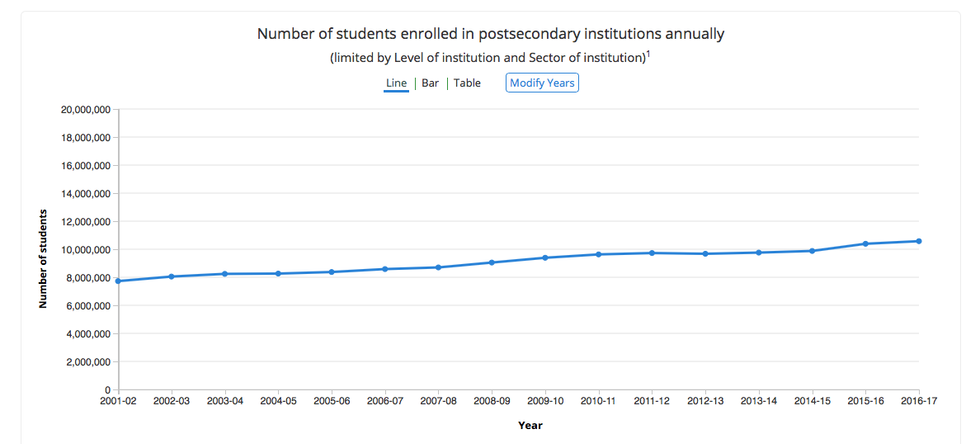If you don't live under a rock, you're probably familiar with calls for tuition-free college, specifically from 2016 and now 2020 presidential candidate, Bernie Sanders. This notion of "free college" is severely misunderstood.
What is the cost of 'free college?'

Chart from National Center for Education Statistics representing the number of students enrolled in public, four-year universities
https://nces.ed.gov/ipeds/TrendGenerator/app/answe...
As you can see from this chart, there were 10,574,547 students enrolled in public, four-year universities during the 2016-2017 school year. According to Student Debt Relief, using data from College Board, in-state students pay $20,770, including room and board, along with other fees. Additionally, out of state students pay $36,420, also including room and board, and other fees. These numbers are estimated averages for the year 2018.
The number from our chart, 10,574,547, is representative of the 2016-2017 school year, while our tuition cost averages are from 2018. While we proceed to formulate our cost estimate, we will have to understand that this is not entirely indicative of the price, only an estimate, and will probably end up being smaller than the actual number.
According to the Washington Post, 72% of college attendees remain in-state. We will be using this number in making our calculation.
It is important to understand, in making this calculation we are using only public, four-year university students, a subset of all university students. My estimated cost of college education for this number of students at this type of university per year is $265,971,006,144. Let me state that this is per year, and according to Student Debt Relief, the cost of public universities is increasing yearly at an average rate of 3.2%.
Also, we must assume that with the institution of so-called 'free-college' there will be an influx of students enrolling in public, four-year universities.
With this in mind, it is fair to assume that the cost would be significantly more than my estimate.
Who's going to pay?
The American tax-payer, of course. Bernie and his cohorts will tell you that the greedy, evil corporations, taxed at a high rate will fund it, but that's just not the case.
Watch the video above. In Sweden, for example, there is federally subsidized, tuition-free college. Contrary to what you may think, the taxes in a country like Sweden squeeze the poor and not the rich. Why is this?
The poor are loyal taxpayers, the wealthy are not.
Not only are big businesses crucial to a healthy economy, but there aren't enough of them to allow for a substantially lower tax rate for the poor.
Instead of our poor having a financial strain lifted in the form of free college, they will receive an undue financial burden. The poor will suffer more, and the middle class will become smaller.
What happens to vocational education?
There has been an existing shortage of skilled workers in the United States, specifically welders, electricians, machinists, and things of the like. With the Institution of tuition-free college, this problem will loom much larger.
According to Career Profiles, "Right now, 53% of skilled trades workers are over the age of 45." These skilled workers also tend to retire earlier because of the physical demands of these jobs. Young people are not joining these careers at the same rate that older skilled workers are having to retire.
Why aren't young people becoming skilled workers? According to a Forbes article discussing this shortage, "American high schools have largely shifted their focus to preparing students for four-year colleges rather than vocational school." More and more students attending university drives costs up and simultaneously drives student debt up. According to the NPR radio program "All Things Considered," "While a shortage of workers is pushing wages higher in the skilled trades, the financial return from a bachelor's degree is softening, even as the price — and the average debt into which it plunges students — keeps going up." There is less to be gained now than ever before, from a college degree.
As more and more people choose university, the value of a degree will continue to deteriorate. With the institution of tuition-free college, more students will be enrolled in public colleges than ever. Degree values will plummet. Schools will be forced to drive costs up to provide ample space and resources to students. The quality of university education will decrease significantly. We will experience an even more severe shortage of skilled workers.
The absence of skilled workers means the detriment of homes, buildings, and infrastructure across the country.
Final Thoughts.
As you can see, not only will tuition-free college come at a cost, it will come at a cost to the poor. Other notable effects are the significant decrease in quality of public universities, and the even further demise of the American skilled workforce.



















